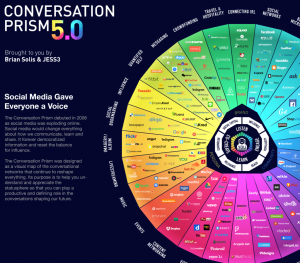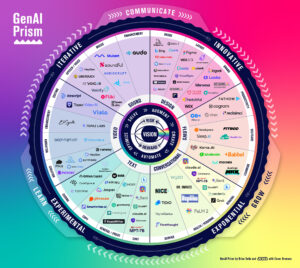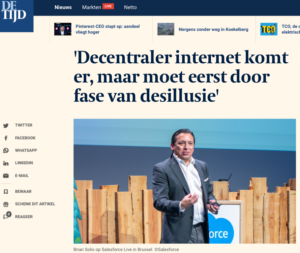
As Twitter and Facebook compete for your attention and social status, there’s another story that serves as the undercurrent for something much more important, a fully pervasive and functional social operating system (OS) that serves as a open platform to connect you, your content, updates, and activity to your friends, peers, and followers across your social graph, regardless of network, browser, or device.
Facebook and Twitter have effectively created immersible destinations and ecosystems that facilitate the development and deployment of applications that not only replicate capabilities currently available in traditional software and cloud computing, but also create a new dynamic for social collaboration, interactivity and engagement hosted in each respective network, desktops, and across the social web. Each network boasts a library of thousands of applications that only continues to burgeon.
Unlike the file interoperability between applications that run on Mac and Windows, Twitter and Facebook platforms are proprietary, although Facebook provides a bridge to automatically port tweets into your Facebook personal News Feed for example.
Twitter and the statusphere have become our attention dashboards that serve as our source of news and information as well as hub for communication – more so than email. We’re just now beginning to recognize and acknowledge this shift in content consumption and production behavior. The new ecosystem for sharing, discovering, and publishing updates and micro-sized content reverberates throughout social networks and syndicated profiles, resulting in a formidable network effect of activity and interaction. It is the digital curation of relevant content that binds us contextually and through the statusphere we can connect directly to existing contacts, reach new people, and also forge new friendships through the friends of friends effect (FoFs) in the process.
Last year, Facebook rolled out its Connect program to extend the platform and also aggregate your disparate social activity by enabling you to login to participating sites and services using your Facebook credentials.

Facebook Connect is a technical bridge that links your Facebook profile with other online networks to feed your associated activity back to your personal Facebook News Feed. For example, if you’re commenting on a blog hosted on the Moveable Type platform, you can now login with your Facebook details and not only will your comment and link to your Facebook profile appear on the blog, the activity of commenting is also linked back into your activity feed for your friends and colleagues to see. Digg allows Diggers to log on using their centralized Facebook ID and for each story they digg, the activity is documented back on their profile. The idea is to collect and present distributed activity in one focused stream to create a centralized hub for presentation and interactivity between you and those within your social graph. Examples and Facebook Connect partners already number in the hundreds if not thousands.
Twitter, at one point, was and maybe still is a Facebook Connect partner. However, the social platform is also going to connect your identity and distributed activity through its new “Sign in with Twitter” program.
Many networks currently facilitate connectivity between activities. You can send updates from participating communities directly back to Twitter, similar to the Facebook program. While many services related to Twitter require your username and password, your credentials were still guarded at the services level as well as in Twitter’s network. Now, your identity is verified at Twitter’s gates and will no longer need to reside in multiple locations.
Instead of creating and maintaining multiple identities, eventually you’ll only have to manage two – Facebook and Twitter – until, perhaps someday, you only need one.
So, back to the Mac vs. Windows discussion. With its new login system, Twitter is attempting to extend its social OS by also aggregating identity and officially channeling outside activity back into the Twitter timeline, which could ultimately feed into Facebook.
After the failed attempt at acquiring the popular micro community and with mass public attention now on Twitter, Facebook now has an official and formidable competitor in the social OS category. It’s userbase is 200 million strong compared to maybe 8 million. But current numbers aren’t reflective of the outcome. This is a long and winding road that will traverse numerous grades and hurdles.
Many are focusing on the technical aspects and openness of Twitter’s authentication system. I believe that the bigger story resides with the platform and the ability to lure developers, foster innovation, and seamlessly connect users and activity to friends, peers and followers to stimulate new registrations, adoption, consumption and interaction. Facebook and Twitter, and other emerging and existing networks on the periphery in the evolving social landscape, will eventually play host to much more that the proverbial “conversation.” They will enable not only a new genre of communication, but also centralized professional and personal collaboration and management.
Helpful Posts on PR 2.0:
– The Race to 1,000,000 Followers Sends Twitter and Social Media into Relevance and Irrelevance
– The Domino’s Effect
– The Conversation Index
– A New Search Engine for Twitter
– Social Media Influences Buying Decisions
– Can The Statusphere Save Journalism?
– Is Social Media Recession Proof?
– Facebook Now 200 Million Strong
– Twitter Traffic Surges to 10 Million
– The End of the Innocence
– The Social Effect
– Putting the Public Back in Public Relations is Now Available
– Twitter and Social Networks Usher in a New Era of Social CRM
– The Human Network = The Social Economy
– Humanizing Social Networks, Revealing the People Powering Social Media
– Are Blogs Losing Authority to the Statusphere?
– I Like You The Emerging Culture of Micro Acts of Appreciation
– Make Tweet Love – Top Tips for Building Twitter Relationships
– Is Twitter a Viable Conversation Platform
Connect with me on:
Twitter, FriendFeed, LinkedIn,Tumblr, Plaxo, Plurk, Identi.ca, BackType, Social Median, or Facebook
—
Subscribe to the PR 2.0 RSS feed.
![]()
—
Now available:


—
pr pr+2.0 pr2.0 public+relations marketing advertising interactive social+media socialmedia brian+solis social media media2.0 media+2.0 2.0 smo social+media+optimization marcom communication publicity facebook twitter social+os os operating+system windows pc mac apple platform developer






Hi Brian,
I find it interesting that Facebook considers itself in direct competition with Twitter. While the two platforms are social networking, they offer very different experiences with very different capabilities for their users. It’s as if the race for popularity is shifting the imporant focus from creating stellar services for users to how do I beat the other guy.
I always find it strange (like @JScmitt) that people feels that Twitter and FB are competing platforms. I think that FB may have thought that Twitter – and it’s growth boom – signaled a new wave of communication that aligned with their status updates. But the actual platforms are so very different.
With the Oprah-effect now in place (and working?) on Twitter, it will be interesting to see not only how that service is affected, but also the seepage into other platforms. Will @oprah and followers start broadcasting their Tweets into other social networks, esp Facebook? Will they look to start using those platforms more aggressively and build more robust presences, especially if Twitter starts to have infrastructure problems from the surge?
Good morning, Brian! Like @J Schmitt and @janequigley before me, I don’t necessarily view the two platforms as competing. For me (and, by association, my clients) they offer a symbiosis that works quite well. Each service offers something very different from the other, but when combined, work very well TOGETHER.
Personally, I’d like to see the two networks try to bridge their gaps even further, by allowing Twitter connectivity to Facebook PAGES, rather than just personal profile pages. Further, since Twitter has, thus far, and in spite of having a seemingly endless stream of venture capital, proven unprofitable, it’ll be interesting to see what its future holds.
I see Facebook and Twitter as non-competing services. I use Facebook to connect to people from my past and current life; people I actually know. I use Twitter to connect with people I have never met.
The concept of a social OS is a big idea and I commend you for taking the time to think this through to the next level.
To build on your idea, I think that Twitter is rapidly becoming an entirely new *capability* that we’re only just learning how to use. It’s allowing us to form self-generated networks based on who we choose to pay attention to. I can see a day in the near future where literally every public website offers the ability to Tweet from every public page. Twitter everywhere if you will.
Facebook, on the otherhand, still operates like a big, but closed system. For the most part we still interact within Facebook’s system and play by Facebook’s rules.
It’s less Mac vs PC and more Linux vs PC.
Thanks for giving my synapses a workout Brian.
Alex Hillinger
Goodchemistry.com
@goodchemist
Hi J Schmitt and others, I think they are indeed competing for something much bigger than how we share updates and connect with friends. There’s a reason that FB vied to acquire Twitter and they’re not the only company looking to do so. It’s widely speculated that this is the last year Twitter will run independently.
In the meantime, both are paving the way for a new dedicated social ecosystem that fuses all distributed activities as well as those isolated applications that currently reside on our individual desktops. It’s not about how we use it today, but how we will use social applications to work, play, and communicate in the future. Remember, social networks have surpassed email usage for the first time. Concurrently, we’re also far from realizing the small glimpses of prospective interactivity we’ve seen and pondered here and there.
Jane, I think you’re right on. It’s estimated that the twitter race + oprah’s show added at least 1 million new users to Twitter, which as we know, will expedite continued growth.
Melissa, you will enjoy this symbiosis at even greater levels in the near future…at some point however, attention will become a precious commodity that will require aggressive and strategic integration to capture it. It’s the innovation in this area specifically that will reveal allies, competitors, and opportunities.
Can both exist? Absolutely – for the time being. Will both continue to thrive? Yes. Will other networks such as FriendFeed emerge as challengers for our attention. Indeed.
Alex, thank you for the thoughts. @ricetopher asked on Twitter that if Facebook vs. Twitter is the new Mac vs. PC, does that make Friendfeed the new Linux?
Brian, I’m back from vacation, now enjoying my routine of reading over your posts that offer a provocative chronicling of the lifecycles in the ecosystem that is social media.
Your latest echoes an increasingly loud hubbub heard across the Conversation Prism about Facebook and Twitter somehow being at odds with or against each other…one versus the other.
The discourse misses the point of Context…from whose point of view are these two hubs of communication and
meaningful interaction *competing?*
Prepositions like *against* or *versus* in between the names of Facebook and Twitter are apt when the Context is or from the perspective of their respective competing Ownership or with respect to their respective competitive acquisition of Revenue. But when speaking from the Context of the Public, then no, we the Public view and use these two communities of content creation and collaboration as Complimentary; we the Public view and use each as go-to hot spots on our itineraries across the Conversation Prism.
Unless anchored by Context, this discourse becomes din- like buzzing in an echo chamber. It adopts reverberations that harken to your own warnings in The Race to Irrelevance or The End of Innocence. The discourse becomes lifted from the realm of the Public into the hollow realm of Punditry?
So Brian, I recommend that we Put The Public back in the Social Media, knowing all too well that both Facebook and Twitter are complimentary destinations in the Public’s voyages across the Conversation Prism. The competition lies solely from the Context of the competing interests of the sites’ Ownership, not their Public.
Thoughts?
In contrast to the OS wars, Twitter and Facebook, can and do exist in harmony. If you haven’t done so already I suggest reading this article: http://tinyurl.com/dxmjlj. It perfectly outlines the difference between the two networks.
It is a sound argument that Facebook is stealing feature from Twitter, but then again whom doesn’t it steal features from(e.g. FriendFeed)? However Twitter was, and remains original, and should deserve respect for that.
I think perhaps Twitter even serves as a greater threat to Google’s marketshare, than Facebook’s(http://tinyurl.com/cjsyyw).
Twitter was apparently programmed in HyperCard, and Facebook has successfully ported Windows Vista to Web 2.0. What more can you want?
It seems like most of the others I don’t see Twitter and Facebook as competing… and do they really? I use both in different ways. I use Twitter much more routinely and I have more affinity for that program, but Facebook serves some needs, too. It’s like various computer programs… I use some a lot, some for certain things once in a while and when I need them, I really do need them. There seems to be enough interest in both applications to go around.
I think it’s often marketing people or the media that want to press the idea of a “competition” because it stirs up interest and controversy. It seems most of us users don’t really care about the competition as long as we can continue to use the aps we love!
I have to agree with many of the comments. Isn’t a better analogy something like cell phone vs PC or Blackberry vs Mac?
cheap nike shoes:http://WWW.FASHION4BIZ.COM
We are wholesaler of Nike Jordan and Other Shoes in China. We are a professional
exporting company in china. We supply many kinds of Shoes, such as Nike Shoes, Jordan
1-23, Air Jordan, AF1, DUNK, Air max series etc. Most of them are in stock and can be
supplied surely on time. All these shoes are packed with original-boxes and cards
our price $33jordan shoes,$15tshirt,15sunglasess, $13cap,$33jean,$35bag
our website:
http://WWW.FASHION4BIZ.COM
http://www.fashion4biz.com/productlist.asp?id=s86
http://WWW.FASHION4BIZ.COM
Thank you share with us, i like power balance. could you tell me where to buy .
i have a lot of os .